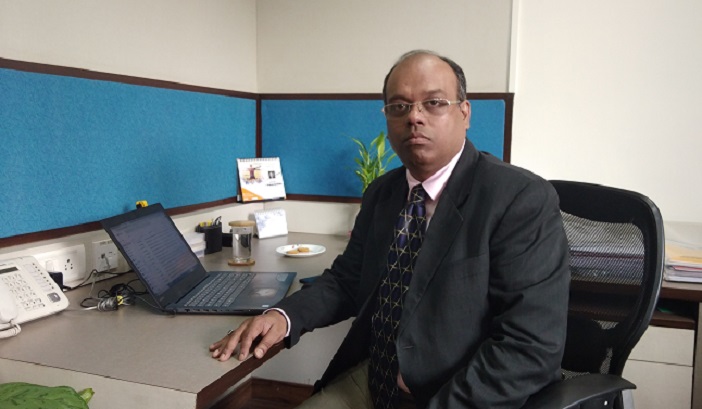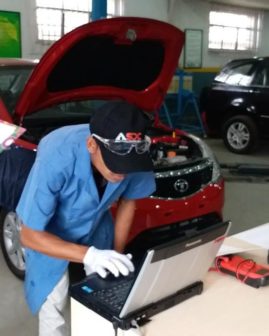With the outbreak of the global pandemic Coronavirus, many industries have been impacted severely. The automotive industry is no exception. All the automotive vehicle manufacturing and component supplier companies have seen a drastic fall in the sales and automotive dealers no footfall in the showrooms. However, there is hope among the industry that the situation will get better and will see positive changes happening in the future.
With advancements in technology, the landscape of skill requirement in the automotive industry is also changing. Technology has changed the way students learn and pick up a skill. Online learning and e-learning have picked up rapidly in India, enabling the youth to upskill, reskill or to learn a new skill from the comfort of their homes. In this Skill Talk, Arindam Lahiri, CEO, Automotive Skill Development Council (ASDC), talks about the skill requirements of the automotive industry, the impact of technological advancement and the adoption of online learning. Read on to learn more about the same from the excerpts from our conversation.
 Use of Technology in the Automotive industry
Use of Technology in the Automotive industry
We have moved from traditional modes of transportation to mechanical vehicles. Some of the electrical parts were added to the mechanical vehicles later. Today, the controls in the car are no more pneumatic or hydraulic, they have become electronically controlled through the use of sensors and computer chips. The controls are now driven by software and real-time data that is analyzed and fed into the car.
As far as the future of the automobile industry is concerned, in terms of technological advancements, we see the future of mobility in terms of the CASE model. CASE stands for Connected, Autonomous, Shared and Electric Mobility. This essentially sums up the mobility as to how the industry is gradually evolving.
The CASE Model
Connected: The vehicles of tomorrow will be connected. Most of the vehicles can be tracked centrally. Vehicle to vehicle signals can be shared. This is already present in some vehicle models across the world and Indian market is seeing introduction of such models as well. Just like how the computers are connected to different computers around the world, similarly vehicles will also communicate with other vehicles, as well as central data centers through cloud. Soon, the vehicles would need technicians who can provide guidance and trouble-shooting support such sophisticated models of cars.
Autonomous: Technology is at various stages of development. It works in a few cases but not in all. Lot of features of assisted driving have already been experimented across the world – like assisted parking, assisted lane driving, assisted braking, speed control, etc. Most of the technology is already available and this will continue to develop as we progress.
Shared: We are moving towards a world that will run on shared mobility. Vehicles will be shared a lot more. More and more people may stop driving self-owned vehicles and different formats will emerge that will give mobility solutions to a lot of people. Cabs is an early model that seems to be working. However, there will be a significant evolution in this in terms of fractional ownership, self-driven rental cars, community-based ownerships, pay per use basis for last-mile connectivity to public transportation, etc.
Electric: When I say electric vehicles, it is basically the lack of Internal Combustion (IC) engine. As the world is talking about cleaner and greener energy, it means hybrid electric vehicles (HeV), battery electric vehicles (BeV) and partially electric vehicles (PeV) with alternate fuels. There will be significant changes in the skill requirements in the industry in the future to address the needs of electric vehicles.
Changing skill requirements in the automotive industry
In terms of the automobile supply chain, like in research and development, sales, service, driving or manufacturing of cars and parts, there is going to be a huge impact of the latest technology. People will have to learn new skills to be able to survive in this industry.
Drivers for a very long time have learned only a few other skills other than driving. It is to check if there is enough water and fuel to run the engine. But as the battery-powered electric cars take over the market, there is no concept of fuel and water. Therefore, drivers will have to understand a lot of diagnostic data onboard, there are going to be sensors in the car and this information is going to be critical. Even now, when people change to fully automatic cars or higher-end models with a lot of diagnostics, they become uncomfortable with their current drivers and look for more skilled drivers with relevant experience.
Many buses in our Indian cities are being converted into electric vehicles. This means, simply knowing how to drive will not be enough. Drivers should know how to drive, how to maximise the use of charge in the battery, understanding the diagnostics, etc. For that matter, there would be certain amount of reskilling required even for driving.
Upskilling of Automotive Service Technicians
 When we talk about service technicians, they mostly do general servicing like changing the filter, checking the coolant, replacing the coolant, etc. But all this will change because some of the newer models may not have any engine. But servicing for cars would be required – for example, software update, running diagnostic software to identify which part needs replacement or recalibration. It will be like a computer hardware technician. An automotive hardware technician will also need these skills to fix some basic problems. As machines are becoming smarter, our skills also should match with it.
When we talk about service technicians, they mostly do general servicing like changing the filter, checking the coolant, replacing the coolant, etc. But all this will change because some of the newer models may not have any engine. But servicing for cars would be required – for example, software update, running diagnostic software to identify which part needs replacement or recalibration. It will be like a computer hardware technician. An automotive hardware technician will also need these skills to fix some basic problems. As machines are becoming smarter, our skills also should match with it.
In our ITIs, the courses are largely mechanical driven and only to some extent they focus on automotive electrical applications. There are no courses on automotive electronics, software for automotive applications, etc. However, these changes will start coming in soon. WorldSkills Competitions for example, looks at candidates who can do all of this. They look for highly skilled youngsters who can perform innovative tasks using technology.
Impact of Industry 4.0 in the Automotive industry
In the manufacturing industry too, with the onset of Industry 4.0, all the machines will be connected. For the same, we are also working with Industry experts. Manufacturing will still happen but running the machines would be with the help of an app from a remote location, including maintenance of the machines.
In lockdown situations like this, jobs will not vanish, but they will change significantly. A Machine Operator cannot remain a Machine Operator alone. He/ she will have to understand the programming of a machine, understand remote maintenance of a machine, run the diagnostics through big data, to be able to do 3-D printing and many more. All these changes may not take place immediately, but it will over a period. On a lighter note, typists were in great demand once upon a time, but now everyone is a typist. It is not a special skill anymore.
Related Article: How digitalization is being leveraged by ASDC to scale skilling and empower the stakeholders – Read More: https://nationalskillsnetwork.in/how-digitalization-is-being-leveraged-by-asdc-to-scale-skilling-and-empower-the-stakeholders/
Though we talk about 4th industrial revolution and the cyber-physical system interaction, what needs to be done by hand, will eventually be done by hand. Even though a lot of manual jobs will become redundant, there will still be many other jobs that will have to be done manually but assisted by machines.
Adoption of online learning
Digital learning or online learning in the domain of skill development and training has picked up very well. Thanks to the video content available on the internet, from where the knowledge or theoretical part of the skill can be acquired by the students. All the knowledge on the theory part of the subject can now be acquired by a student without any physical interaction with the trainer.
As far as hand-on training is concerned, one can prepare oneself for hands-on task by watching the videos. A physical task can be understood by watching the videos on such demonstrations. So, when the student gets to perform in the workplace or on the shop floor, they will be able to do it better. This will be better than trying to do a task in the shop floor for the first time. Therefore, the risk factor is reduced, and a lot of time is saved.
An efficient blending of online and physical learning will probably be the ideal solution for the future.













Excellent Opportunity.